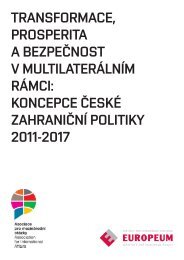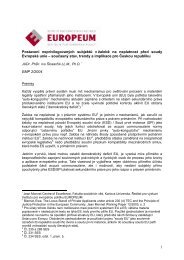eu constitutionalisation - EUROPEUM Institute for European Policy
eu constitutionalisation - EUROPEUM Institute for European Policy
eu constitutionalisation - EUROPEUM Institute for European Policy
Create successful ePaper yourself
Turn your PDF publications into a flip-book with our unique Google optimized e-Paper software.
Chapter 6: A ‘saut constitutionnel’ out of an intergovernmental trap?‘positions’ to be taken by the Union as well as “strengthening systematiccooperation between member states in the conduct of policy” (see Art.III-294 (3c)). Except <strong>for</strong> the term ‘<strong>European</strong> decision’ the text confirmsthe now conventional tool box of the CFSP.For the tasks of the <strong>European</strong> Security and Defence <strong>Policy</strong> the Union canresort to “civilian and military means” (Art. III-309 (1)). The instruments <strong>for</strong>operations remain, however, under national control: “member states shallmake civilian and military capabilities available to the Union“ (Art. I-41 (3)).“Expenditure arising from operations having military or defence implications”(Art. III-313 (2)) shall not be charged to the Union budget. What isnew, however, is the establishment of “specific procedures <strong>for</strong> guaranteeingrapid access to appropriations in the Union budget <strong>for</strong> urgent financing ofinitiatives in the framework of the common <strong>for</strong>eign and security policy, andin particular <strong>for</strong> preparatory activities“ <strong>for</strong> security and defence tasks (Art.III-313 (3)). For preparatory activities which are not financed by the budget,a “start-up fund” shall be established with contributions by member statesdecided upon by a qualified majority vote in the Council (Art. III-313 (3)).Overall, the changes in comparison to the status quo are limited: provisions<strong>for</strong> a real transfer of resources to the EU level, if only <strong>for</strong> a limited scope, asthe Monnet-Method proposes, are not <strong>for</strong>eseen.3.3. Systematic cooperation through self-imposedobligations: more than constitutional prose?In specifying the general obligations of “sincere cooperation” and “mutualrespect” between the Union and the member states (Art. I-5 (2)), the textemphasises the obligation of member states to “actively and unreservedlysupport the Union’s common <strong>for</strong>eign and security policy in a spirit ofloyalty and mutual solidarity” in compliance “with the Unions action …They shall refrain from action contrary to the Union’s interests or likely toimpair its effectiveness” (Art. I-16 (2); see also Art. III-294 (2)).To guarantee the application of these norms <strong>for</strong> loyal behaviour “the Councilof Ministers and the Foreign Minister shall ensure that these principles arecomplied with” (Art. III-294 (2)). Moreover, “The Union Minister <strong>for</strong> ForeignAffairs … shall ensure implementation of the <strong>European</strong> decisions adoptedby the <strong>European</strong> Council and the Council [of Ministers]“ (Art. III-296 (1)).Chapter 6: A ‘saut constitutionnel’ out of an intergovernmental trap?These provisions could be interpreted as a ‘watchdog function’ <strong>for</strong> the ForeignMinister²⁷ as ‘guardian’ of the rules of the (CFSP) game based on soft cooperationamong peers. As opposed to the <strong>European</strong> Commission in other fields ofthe Union’s competence, he/she may, however, not invoke the Court againsta Member State. Past diplomatic practice in the ‘living constitution’ of thepresent CFSP gives little reason to expect the Union Minister to resort to sucha ‘moral instance’. The Minister would be more likely to uphold group disciplineby ‘naming, shaming and blaming’ members <strong>for</strong> non-compliance; alsodifferent cases of self-coordination among member states²⁸ would not supportsuch a moral persuasion. Thus the new institution is not likely to establish itselfas a “third party” which monitors compliance²⁹.The question, thus, remains if and how these principles <strong>for</strong> appropriatebehaviour³⁰ can turn into guiding norms in real life practice: will the memberstates by (daily) “autonomous voluntary acts” accept “the <strong>European</strong>constitutional discipline”³¹ especially in those areas they perceive to be ofvital national interest? Will the legal text lead to a strong peer group pressureto establish a high intra-group discipline?In case of conflicts, we would expect that the cost/benefit calculation byrational member governments will continue to lead towards non-compliance;they can interpret these <strong>for</strong>mulations differently, and in any case evadethose written obligations without sanctions. They are offered ‘free rider’opportunities wishing to benefit from the solidarity of others, without havingto abide by the common rules; <strong>for</strong> reasons of short-term self-interest³² theymight downgrade a possible decline of their reputation as ‘reliable partners’³³or ‘good <strong>European</strong>s’. It is thus to be expected that the existing and amendedprovisions will not create a regime sufficiently strong to induce governmentsand diplomats to translate the constitutional norms into everyday practice.As in the past, the behaviour of member states will be focused on their perceptionsof national interests especially in ‘high-politics’ crises. Thus the riskis high that these <strong>for</strong>mulations will prove to be no more than constitutionalprose, without real relevance <strong>for</strong> the living constitution.27) See JOPP and REGELSBERGER (2003), p. 559, RISSE (2003), p. 570.28) See e. g. MEYER (2004).29) See GOLDSTEIN, KAHLER, KEOHANE and SLAUGHTER (2000).30) See MARCH and OLSEN (1989).31) WEILER (2002), p. 568.32) HASENCLEVER, MAYER and RITTBERGER (1997), KEOHANE (1984), KRASNER (1983), WESSELS (2000), pp. 72-74.33) KEOHANE (1984), p. 244.206207








